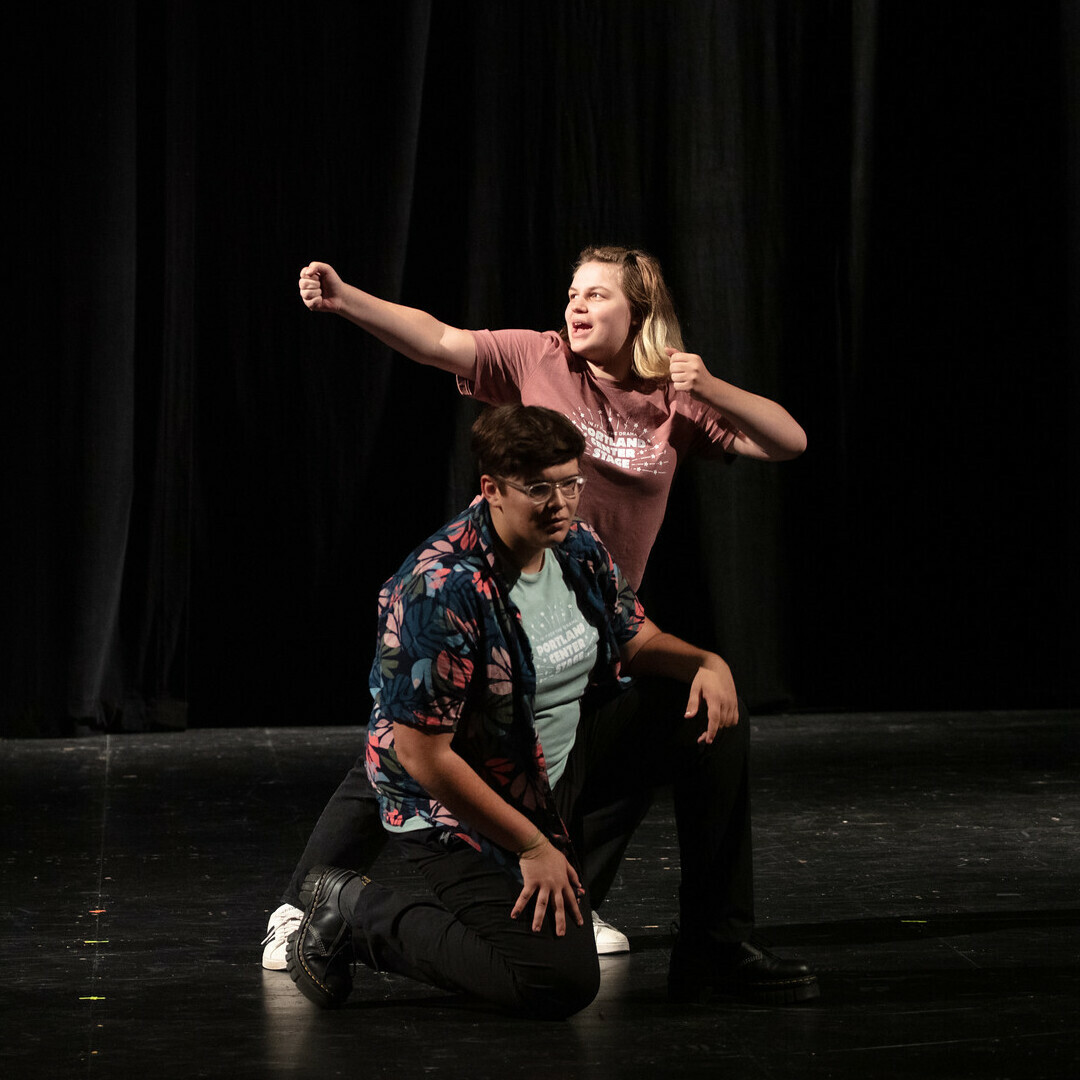Behind the Curtain: Spotlight on Jamie & Troy
Literary Manager Kamilah Bush sat down with actor Jamie Sanders and autism consultant — and actor in his own right — Troy Sawyer.
Kamilah Bush: How would you describe yourself as an artist?
Troy Sawyer: I am primarily a stage actor. I started out in musicals and I went to college for music and then did some odd jobs. I had some emotionally draining experiences in theater when I was younger, so I wasn’t sure if I wanted to continue with acting. And then after a few failed odd jobs after college, my therapist was like “Oh just go on an audition!” Now, I act in theater and film and also teach people in the arts about what it’s like to live with autism.
Jamie Sanders: There's a type of poetry called erasure, or blackout poetry, where a poet takes any pre existing text — a book, a letter, a power drill user manual, etc. — and obscures/blacks out portions of the text to create a poem. I place a lot of value in clarity — of language, of action, of intention. I have a mile-a-minute brain that aggressively spits out ideas, and that can either be a hindrance or a wonderful tool depending on my willingness to cut things out.
KB: What drew you to theater and becoming an artist?
TS: I realized that creating theater is such a healing and transcendent practice. It makes you feel like nothing else is missing. What other art form do you get to just practice being present within a story? Being on the autism spectrum, my brain goes a mile a minute and constantly worries about everything. Did I do that right? Did I say this right? There’s a lot of anxiety around that. I wasn’t diagnosed with autism until I was 19. I debated not continuing with acting because there were no known austisitc actors that I could say, “Well if they did it, I can do it.” There are areas of life that I just can’t navigate because my brain can’t comprehend the rules that everybody else sets out. But in the theater, there's a script. It’s so liberating for me to not have to worry about the social norms or the nonverbal cues of people. All I have to do is bring the script to life.
JS: Honestly, my parents. They REALLY REALLY love theater, like maybe a little TOO much, and they've shared that love with me. I have plenty of other interests, but I've had the absolute privilege of watching both of my parents forge lives and careers in the theater with patience, talent, and precision all while being there to give me the love I needed. To this day they are making and iterating on their own incredible art, but always find the time to see what I'm working on and engage with it (even if they don't always "get it"). It is the greatest gift in the world to have them and their love as my base.
KB: Troy, what is your role on Curious Incident and how do you help to tell the story?
TS: I am the autism consultant for Curious Incident. My job is to give the perspective of an autistic person to the cast and crew so that they can better understand what an autistic person experiences in various situations. It’s always important to get the perspective of an underrepresented group when portraying their stories because often the group’s lack of representation in media has led to misinformation and misconceptions that are hard to avoid unless you get direct input from that group. This is incredibly important with the autism community because autism is first and foremost a communication disorder. Much of the autism information available has been written and researched by people who have not lived as autistic and therefore don’t fully understand what autistic people are experiencing. Simultaneously, not giving autistic people the resources they need to communicate with people has robbed them of being able to share their stories and experiences to the same extent as neurotypical people. In a production like this, a consultant is vital to drawing the line between information and misinformation.
KB: The novelist who wrote Curious Incident says that he didn't set out to write a character with a particular diagnosis. In what ways do you see your own experience mirrored in the play? In what ways are they different?
TS: First off, I do not believe that the author did not set out to write a character with autism. It may not state it explicitly in the text, but the traits and overall communication of Christopher are so clearly autistic. To take traits and experiences of an underrepresented community for your story, only to claim that it wasn’t explicitly about that community, is extremely disrespectful and appropriative. But ultimately, I can relate to the idea of feeling like you’re the only person around who knows what you’re going through. You feel isolated, you feel unsafe, and you feel alone. You stick to what you’re good at and dream of doing something extraordinary. Where my path differs, is that my autism was a mystery to me most of my life. I did not have the opportunity to learn coping tools in my youth and most people in my immediate circle treated me like I was the problem. Christopher and his community seem to be aware that he’s autistic or at least that he’s neurologically different. Christopher doesn’t have to explain himself and his experiences to everyone in his immediate circle, and he is learning tools that hopefully will help him function (to an extent) in a predominantly neurotypical society. The support and awareness of the community around you makes a huge difference in how you perceive yourself and what you’re capable of. I hope neurodivergent people viewing this show will be able to watch and see that they are not the problem, and that they can be bigger and greater than the ignorance of the community they were born into. I also hope neurotypical people will watch this and come away with a greater understanding of how their actions affect the neurodivergent people in their lives.
JS: Christopher can definitely feel scattershot in his representation of neurodiversity at times, and that's been both a help and a hindrance. It sparks the urge as a performer to keep him vague for the sake of more people feeling represented, but I always want to balance that with the fact that this is MY Christopher, and the best way to do justice to him is to imbue him with my truth. I have a number of mannerisms and movements that I "program" into my body using my tourettic impulses — I find ways to move that satisfy my urges in my wrists and elbows, then combine them with motions that could be recognizable to some as stimming. So I'm using the circumstances of my specific disorder as a tool to help me better embody something broader — Chistopher and I move our hands for different reasons, but I am not pretending to have the urge to move my body like I do. His being so broad also allows neurodiverse actors in other productions to lean harder into other aspects to represent their own specifics. There is a certain consistency to the character's journey as dictated by the text, but the malleability of Christopher's diagnosis offers wonderful potential.
KB: Lastly, what inspires you?
TS: Telling new stories. Telling stories that inspire people. I love just getting to make people feel seen. Theater is ultimately a mirror to what’s going on in our world. Even if something on stage has no connection to reality at all, the mere presence of it is a reflection of what’s going on in the world. Take Into the Woods for example. You can’t tell me that people who went to see that show in the 80s, where half the cast is dead by the end, didn’t see a reflection of the AIDS epidemic. To have the opportunity to be that mirror for people is powerful.
JS: There are a lot of honest but generic answers I could give — great art, campfires, animals being kind to one another — but recently I've been specifically inspired by this guy named James Allen McCune, whose videos I watch on YouTube. For whatever reason, his journey with mental health has happened at an almost unsettlingly similar pace to my own, with matching peaks and valleys. His willingness to discuss his experiences, explore his own inadequacies, and, when needed, take a step back has directly led to me recognizing my own needs and doing a better job of taking care of myself and the people around me. So shout-out to James Allen McCune.
Portland Center Stage is committed to identifying & interrupting instances of racism & all forms of oppression, through the principles of inclusion, diversity, equity, & accessibility (IDEA).

















